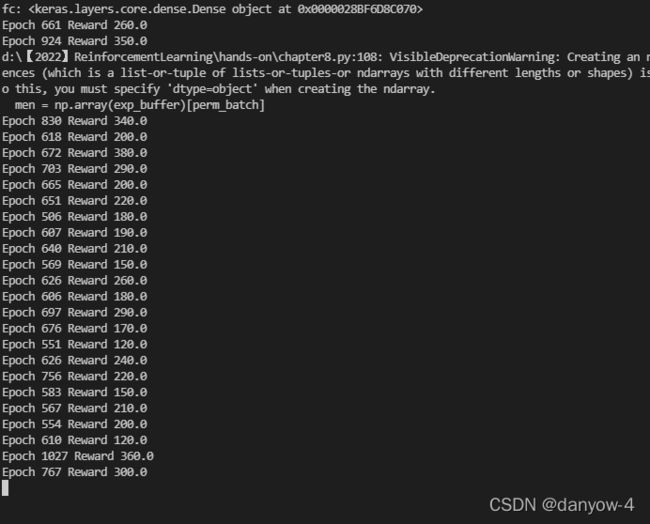【强化学习】实现Atari游戏的自动化学习(仅供参考)
问题描述:
参考书的第八章《Atari Games with Deep Q Network》因为版本变更太多,所以本人直接更改源代码,从而实现程序的运行,但是因本人能力有限,本章代码只能单纯实现代码的运行
代码展示:
'''Building an agent to play Atari games'''
from cv2 import merge
from matplotlib import units
import numpy as np
import gym
import tensorflow as tf
from tensorflow.keras.layers import LSTM
from collections import deque,Counter
from tensorflow import keras
#定义preprocess_observation的函数,
# 用于预处理输入游戏屏幕,缩小图像的大小,图像转换成灰度。
coior = np.array([210,164,74]).mean()
def preprocess_observation(obs):
# Crop and resize the image
img = obs[1:176:2, ::2]
# Convert the image to greyscale
img = img.mean(axis=2)
# Next we normalize the image from -1 to +1
img = (img - 128) / 128 - 1
return img.reshape(88,80,1)
import gym
env = gym.make("MsPacman-v0")
n_outputs = env.action_space.n
# env.render()
# print(n_outputs)
#define a q_network function for building our Q network. The input to our Q network will be the game state X.
tf.compat.v1.reset_default_graph()
tf.compat.v1.enable_eager_execution()
#@tf.function
def q_network(X,name_scope):
tf.compat.v1.disable_eager_execution()
#(None, 88, 80, 1)
#X = tf.compat.v1.placeholder(tf.float32, shape=X_shape)
X = tf.float32
#initialize layers
initializer = tf.keras.initializers.variance_scaling()
with tf.compat.v1.variable_scope(name_scope) as scope:
layer_1 = LSTM(units =10, kernel_initializer=initializer)
flat =tf.keras.layers.Flatten()
fc= tf.keras.layers.Dense(units = 10,kernel_initializer=initializer)
vars = {v.name[len(scope.name):]: v for v in tf.compat.v1.get_collection(key=tf.compat.v1.GraphKeys.TRAINABLE_VARIABLES, scope=scope.name)}
output = 32.0
return vars, output
#define an epsilon_greedy function
epsilon = 0.5
eps_min = 0.005
eps_max = 1.0
eps_decay_steps = 500000
def epsilon_greedy(action,step):
p = np.random.random(1).squeeze()
epsilon = max(eps_min,eps_max - (eps_max -eps_min) * step / eps_decay_steps)
if np.random.rand() start_steps:
# sample experience
o_obs, o_act, o_next_obs, o_rew, o_done = sample_memories(batch_size)
# states
o_obs = [x for x in o_obs]
# next states
o_next_obs = [x for x in o_next_obs]
# next actions
#next_act = mainQ_outputs.eval(feed_dict={X:o_next_obs, in_training_mode:False})
next_act = mainQ_outputs
# reward
#y_batch = o_rew + discount_factor * np.max(next_act, axis=-1) * (1-o_done)
o_rew =o_rew.astype(int)
o_done = o_done.astype(int)
o_rew = 0
o_done = 0
discount_factor = int(discount_factor)
next_act =32.0
y_batch = (discount_factor *next_act)
# merge all summaries and write to the file
#mrg_summary = merge_summary.eval(feed_dict={X:o_obs, y:np.expand_dims(y_batch, axis=-1), X_action:o_act, in_training_mode:False})
mrg_summary = merge_summary
#file_writer.add_summary(mrg_summary, global_step)
# now we train the network and calculate loss
#train_loss, _ = sess.run([loss, training_op], feed_dict={X:o_obs, y:np.expand_dims(y_batch, axis=-1), X_action:o_act, in_training_mode:True})
#episodic_loss.append(train_loss)
# after some interval we copy our main Q network weights to target Q network
if (global_step+1) % copy_steps == 0 and global_step > start_steps:
copy_target_to_main.run()
obs = next_obs
epoch += 1
global_step += 1
episodic_reward += reward
print('Epoch', epoch, 'Reward', episodic_reward,) 实现截图:
参考:
《Hands-on Reinforcement Learning with Python. Master Reinforcement and Deep Reinforcement Learning using OpenAI Gym and TensorFlow》

